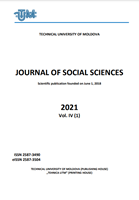DIGITAL ECONOMY. THE CONVERSION OF THE TRADITIONAL ECONOMY AS A CONSEQUENCE OF THE ICT INNOVATIONS
DIGITAL ECONOMY. THE CONVERSION OF THE TRADITIONAL ECONOMY AS A CONSEQUENCE OF THE ICT INNOVATIONS
Author(s): Alexandra UngureanuSubject(s): Supranational / Global Economy, Business Economy / Management, ICT Information and Communications Technologies, Socio-Economic Research
Published by: Universitatea Tehnică a Moldovei
Keywords: innovation; progress; globalization; digital economy;
Summary/Abstract: The ability of the global economy to compete and evolve in the 21st century increasingly depends on the innovative and efficient use of information and communication technologies (ICT). Over the last decade, digitalization has improved decision-making in the global business ecosystem in a variety of contexts, and recent advances in technology transformed the business models in a way that reshapes the economic actor’s interaction with business activities. The emergent conversion of the traditional economy is changing as automation tools, process standardization, and reuse of goods along with cloud computing technology shape the global economy towards digitalization, arising the concern to ensure the development of ICT proficiency in all sectors of the economy in order to create economic balance, avoiding a potential crisis based on the innovation deficit. The speed of digital transformation in the business environment will directly affect the models of economic growth and social development in the future. The present technological revolution is a valid indicator of the civilization progress of the 21st century and the digital transformation requires an improved association of organizational e-leadership skills, innovation, and business development based on business intelligence concepts. Therefore, the reduction of e-leadership skills can be a competitive disadvantage for the industry and a constraint on potential growth. From these considerations, the aim of the paper is to examine the diffusion of business intelligence elements in the global economy, providing examples of business models that have emerged as a result of digitalization improvement, and contributes to an overview of the main features of the digital economy that have emerged in these business models. Using a methodology based on the systematic review of the literature and global analysis regarding the topic, the paper presents a framework of the role that digitalization performs in the global economy transition from analog to digital configuration.
Journal: Journal of Social Sciences
- Issue Year: IV/2021
- Issue No: 1
- Page Range: 12-20
- Page Count: 9
- Language: English

